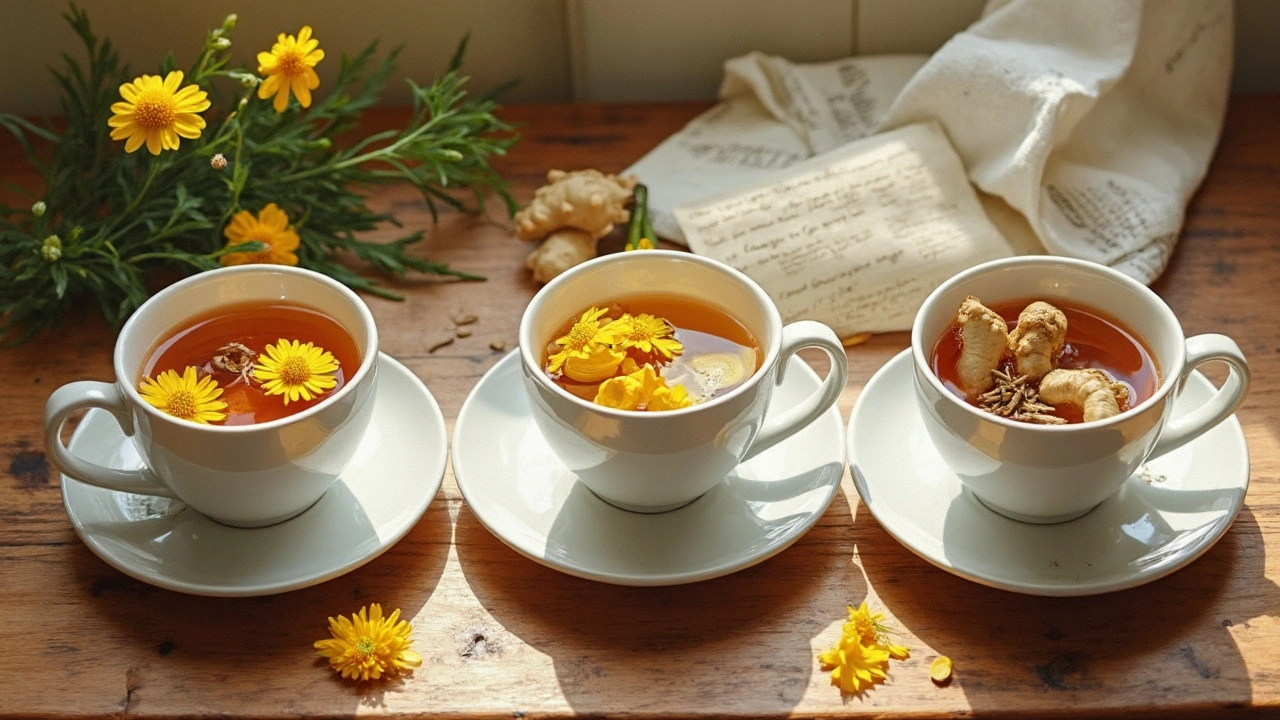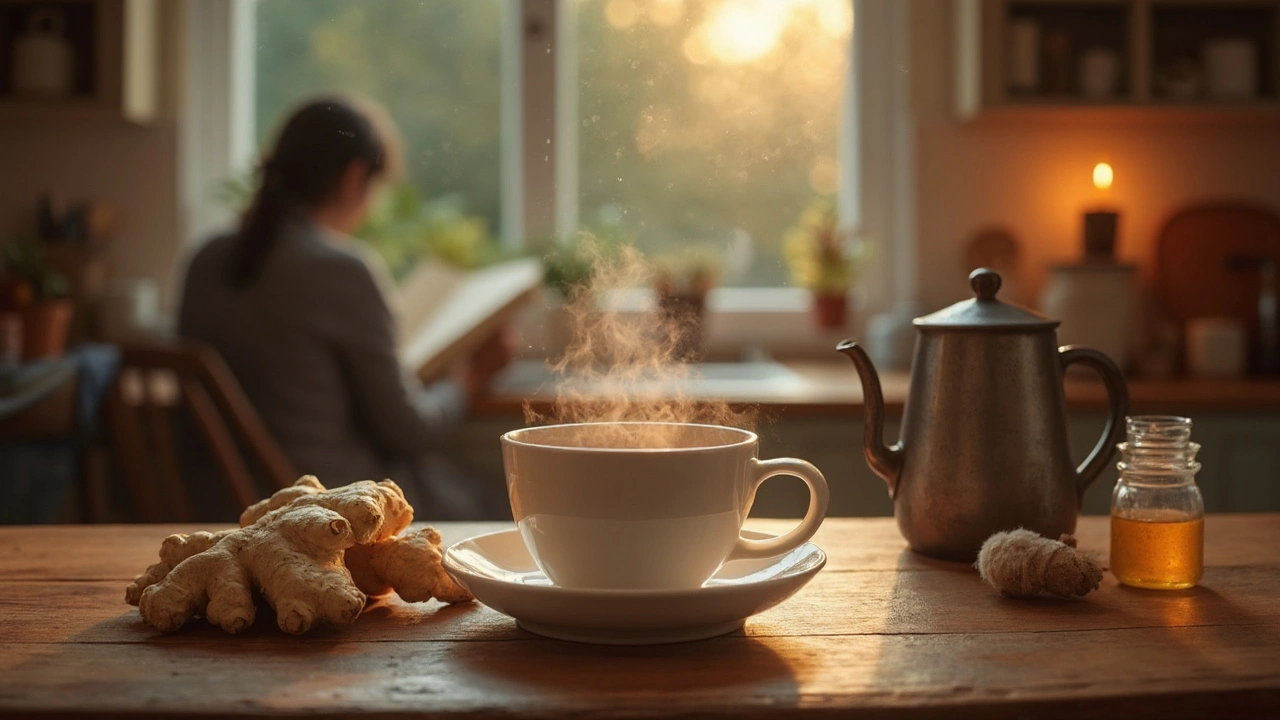Ever had that heavy, fluttery feeling in your stomach right after a meal? Maybe it’s a bad case of nerves, a little too much spicy food, or simply a gut that rebels from time to time. Stomach troubles pop up for all kinds of reasons, and let's face it: not everyone wants to pop a pill every time they feel off. The good news? Your kitchen probably already holds some serious soothing power. No doctor script required—just the right herbal tea for upset stomach and know-how to brew it right.
Why Herbal Teas Work for an Upset Stomach
Imagine having a go-to fix that skips the pharmacy line and still calms your belly. Herbal teas work in a few fascinating ways. They act fast—the warmth itself relaxes the digestive muscles, which can help reduce cramping and bloating. Plus, specific ingredients in herbal teas have been used for centuries for exactly this purpose. Ginger cuts queasiness, chamomile soothes the gut lining and mind, and fennel helps gas move along more comfortably. Each has unique active compounds: gingerol in ginger, apigenin in chamomile, anethole in fennel. What sets these herbs apart is not just tradition, but also growing scientific backing that shows they support traditional uses. For example, a 2019 review in "Nutrients" journal confirmed ginger’s effectiveness for relieving mild digestive distress and nausea in adults, especially after large or fatty meals.
Let’s look at how these teas work in real situations. Ever felt that urge to curl up after greasy food, or maybe regretted too much cake at a birthday party? Ginger and fennel both speed up gastric emptying, helping your body move food out of your stomach more smoothly and making that “overfull” feeling less intense. Chamomile, meanwhile, pulls double duty by relaxing both mind and stomach—psychological stress is a huge trigger for stomach upset, so this one is a must if you tend to worry or overthink.
If stats help you trust your tea, check this out. According to the National Institutes of Health, one-third of adults experience frequent digestive troubles—but 62% prefer natural remedies over standard medicines for mild symptoms. Herbal teas top that list. Plus, these blends are gentle enough that even when you’re feeling crummy, they rarely make anything worse. No harsh chemicals, just plants you can pronounce, and the science is pretty solid for the key picks.
| Tea | Main Compound | Traditional Use | Documented Effect |
|---|---|---|---|
| Ginger | Gingerol | Nausea, bloat | Decreases nausea, speeds digestion |
| Chamomile | Apigenin | Cramping, stress | Reduces cramps, calms nerves |
| Fennel | Anethole | Gas, indigestion | Relieves gases, helps motility |
It’s not just about what you steep, either. Herbal teas, enjoyed slowly, can become a gentle ritual—make your tea, inhale the aroma, feel your hands warmed by the cup, and set aside a few moments for yourself. Small lifestyle tweaks like these really add up. For people with recurring or severe stomach issues, a daily tea habit might not fix everything, but for those occasional flutters, it’s an easy and effective first step.
If you’re wondering where to start or what blends to try, you don’t have to go far. Check out this page on stomach calming tea for creative options and ready-to-steep blends that take the guesswork out of your tea ritual.

Ginger, Chamomile, and Fennel: The Ultimate Stomach-Soothing Trifecta
Ginger is the superstar of the bunch, with roots (literally) in every culture from India to the Caribbean. Its effectiveness has real numbers behind it. For example, in clinical trials, ginger tea reduced nausea scores by 38% in people recovering from mild stomach bugs and food discomfort. But it’s not just about nausea—ginger also encourages the digestive system to process food a little faster. That’s huge when your stomach feels stuck. A simple way to make fresh ginger tea is to slice a thumb-sized piece of ginger, simmer it in hot water for 10 minutes, then add a squeeze of lemon and a drip of honey if you’re feeling fancy. The best part? The spiciness actually gets milder as you boil it longer.
Chamomile has earned its calming reputation for good reason. It’s packed with apigenin, a compound shown to help muscles relax. So if your stomach feels tense or achy (or your brain won’t stop worrying), chamomile tea can hit both issues at once. Science says a daily cup reduces both pain and discomfort from indigestion, especially in people with anxiety-prone guts. Preparation is simple: use one tablespoon of dried chamomile flowers (or a bag), steep in almost-boiling water for five minutes, and you’re ready to sip. Add a pinch of cinnamon or a sliver of apple for a twist—these both pair well and amplify the soothing effect.
Fennel is the unsung hero of the trio, but it deserves way more attention. This crunchy, liquorice-tasting seed was a staple in ancient Rome and Egypt, where it was chewed after feasts to freshen breath and relieve indigestion. Modern studies back this up: fennel contains anethole, which helps dispel gas from the digestive tract, reducing bloating noticeably in people who deal with belly distention after eating. For fennel tea, just crush a teaspoon of whole seeds, steep in boiling water for 7-8 minutes, strain, and taste. It’s naturally sweet, so you rarely need sugar—perfect if you’re avoiding extra calories after a big meal.
If you want to get creative, blending these teas is possible—and even encouraged. Try combining chamomile with a pinch of ginger for both calm and a little digestive kick, or fennel with chamomile for a smooth, floral-sweet result. These blends won’t just help your stomach—they make tea feel special, not boring. If you’re a fan of cooler drinks, all three can be brewed double-strength, chilled, and poured over ice with lemon for a refreshing post-meal tonic.
- Ginger Tea Tip: The thinner you slice the ginger, the stronger the tea—start small until you know your heat tolerance.
- Chamomile Tea Tip: If you find the taste too floral, add a rosemary sprig when steeping. It helps cut bitterness and boosts calmness even more.
- Fennel Tea Tip: Crushing the seeds just before making tea releases the most aroma and flavor—don’t pre-crush unless you want weaker tea.
Most people tolerate these herbal teas really well. But, a quick heads-up: if you have blood clotting disorders, go easy on ginger, and if you’re allergic to ragweed, steer clear of chamomile. Fennel is super mild, but if you’re pregnant, check with your doctor before using it every day, since strong fennel has slight estrogen-like effects. Common sense prevails—start with a cup, see how it sits, and go from there.

Simple Steps and Creative Tweaks for Everyday Use
At-home herbal teas don’t need to be complicated. Fancy gadgets aren’t needed. For ginger tea, a pot, a kitchen knife, and a mug usually do just fine. If you use dried ginger powder, start with 1/2 teaspoon per cup and adjust to taste—it’s potent. For chamomile, either loose dried flowers or bagged are fine. Look for organic if you want to avoid pesticides, but don’t let this stop you if the store brand is all you have. Fennel seed is sold in bulk or spice jars; always give it a sniff first—if the aroma has faded, so will the tea.
Water temperature matters (seriously, it’s not snooty—it changes how much flavor and benefit you get). Ginger and fennel like boiling water, around 212°F (100°C). Chamomile prefers just-off-the-boil, about 200°F (93°C), to avoid bitterness. Steep times vary: ginger and fennel both like 6-10 minutes, chamomile 4-5 minutes. If you forget your tea steeping, don’t panic—over-steeping won’t ruin the health benefits, but it might get too strong for your taste.
For those who want to dress things up, here are some easy flavor ideas:
- Add orange or lemon peel to any of these teas for soothing citrus aroma that also supports digestion.
- Drop in a few mint leaves for extra breath-freshening power alongside fennel.
- Mix a spoonful of honey into ginger or chamomile if you have a sore throat along with your upset stomach (just no honey for babies).
- If you like your tea cold, double the steeping strength and let cool in the fridge. It’s perfect as a mild afternoon pick-me-up after a big lunch.
Storing herbal tea is a breeze. Pre-slice ginger and freeze it for months, ready to toss into water any time. Dried chamomile keeps in an airtight jar for up to a year, just keep it cool and dark. Fennel seeds outlast almost any spice, but aim to use up a batch within 6 months for best flavor.
And if life gets chaotic or travel keeps you away from your kitchen, there are pre-made tea bags and blends aplenty. Go for reputable brands—look for those that list only the actual herb, not a parade of “natural flavors” and fillers. For a fast roundup, you can always use this comprehensive list: stomach calming tea recommendations you can buy or make at home.
It’s easy to overlook the power of rituals—a simple cup of warm herbal tea after a meal can make all the difference between feeling sluggish and feeling soothed. So next time your stomach grumbles after dinner, skip the medicine box and let a bit of kitchen magic work for you. Ginger, chamomile, and fennel have your back, with science (and centuries of experience) to prove it. You just have to give them a place in your routine.

James Doyle
May 22, 2025 AT 04:27
When evaluating the biochemical cascade that underlies dyspeptic episodes, one must first acknowledge the integral role of the enteric nervous system in maintaining homeostatic equilibrium. The thermic effect of a warm infusion stimulates visceral afferents, thereby modulating gastrointestinal motility via vagal pathways. Gingerol, the phenolic constituent of Zingiber officinale, engages transient receptor potential channels, attenuating nausea through both peripheral and central mechanisms. Concurrently, apigenin derived from Matricaria chamomilla exerts anxiolytic activity by potentiating GABAergic transmission, which indirectly reduces stress‑induced hyperacidity. Anethole, the aromatic ether of Foeniculum vulgare, facilitates smooth‑muscle relaxation and enhances luminal gas transit, mitigating bloating in a dose‑dependent fashion. Empirical data from randomized controlled trials substantiate a statistically significant reduction in postprandial discomfort when these botanicals are administered in a standardized decoction. Moreover, the synergistic interaction between gingerol and anethole amplifies cholinergic signaling, accelerating gastric emptying beyond the sum of individual effects. From a clinical perspective, prescribing a tri‑herbal protocol circumvents the iatrogenic risks associated with synthetic antiemetics, such as anticholinergic burden and hepatic enzyme induction. Nutritional epidemiology further corroborates that populations with habitual consumption of these phytochemicals exhibit lower prevalence of functional dyspepsia. It is also imperative to consider the pharmacokinetic profile of each herb; for instance, the bioavailability of gingerol is enhanced when co‑steeped with acidic citrus peel, a fact often overlooked in lay formulations. In practice, a pragmatic preparation involves simmering freshly sliced ginger for ten minutes, adding a tablespoon of dried chamomile, and introducing crushed fennel seeds during the final minute of infusion. This method maximizes extraction efficiency while preserving volatile oils that contribute to the therapeutic aroma. Patients should be counseled to ingest the brew slowly, allowing the temperature gradient to facilitate mucosal absorption without inducing thermal injury. Finally, clinicians ought to screen for contraindications such as coagulopathy or ragweed allergy, ensuring that the intervention aligns with personalized medical guidance. In sum, the integration of ginger, chamomile, and fennel into a structured tea regimen represents a evidence‑based, low‑risk strategy for alleviating episodic upset stomach and restoring digestive harmony.
Edward Brown
May 30, 2025 AT 15:14
Big pharma doesn’t want you sipping ginger tea because it cuts into their anti‑nausea pill market and they hide the truth behind glossy ads.
ALBERT HENDERSHOT JR.
June 8, 2025 AT 02:01
That perspective is a reminder that sometimes the simplest solutions are the most effective, especially when they’re backed by both tradition and modern research :) Keep experimenting safely and share what works best for you.
Suzanne Carawan
June 16, 2025 AT 12:47
Oh, because we definitely needed another trendy tea to solve all our gut problems.
Kala Rani
June 24, 2025 AT 23:34
I’ll bet the “science” you cited ignores the fact that most studies are funded by tea companies so the results are suspect. You should read the full papers before shouting about health benefits.
Donal Hinely
July 3, 2025 AT 10:21
Listen, if you think a kitchen herb can magically repair a chaotic gut, you’re living in a fairy‑tale version of culinary culture that glorifies myth over measurable outcomes. The reality is that aggressive inflammation won’t bow to a gentle brew without addressing the root dietary triggers, and anyone who pretends otherwise is selling you a sugar‑coated lie.
christine badilla
July 11, 2025 AT 21:07
Whoa there, Donal! My stomach was practically screaming a solo at the last dinner, and that ginger‑chamomile‑fennel combo swooped in like a superhero cape, turning my apocalypse into a calm tea party. I can’t even describe the drama of the first sip; it was like the universe pressed the pause button on my panic.
Octavia Clahar
July 20, 2025 AT 07:54
Honestly, while the hype can be overdone, there’s genuine merit in the soothing properties of these herbs, and dismissing them outright ignores the nuanced balance they can bring to a sensitive digestive system.
eko lennon
July 28, 2025 AT 18:41
There’s a certain poetry to the way a humble herb, plucked from a garden patch, can command the attention of an overtaxed gastrointestinal tract, and I find myself marveling at this quiet rebellion against modern chemical overload. First, the act of boiling water itself carries a ritualistic weight, a shared cultural memory of hearth and home that primes the body for relaxation. As the ginger slices tumble into the cauldron, their pungent aroma rises like an aromatic flag signaling the onset of therapeutic intervention, and one can almost hear the microscopic cilia of the stomach lining cheering in anticipation. Next, the chamomile blossoms unfurl in the swirling liquid, releasing apigenin with a subtle grace that mirrors the gentle easing of a tight knot; the visual of golden petals drifting evokes a scene from an old painting, and this visual cue further calms the nervous system. The fennel seeds, crushed just before steeping, crack open like tiny fireworks, liberating anethole which then whispers to the intestinal muscles to release trapped gas, a process as theatrical as a curtain call. The combined phytochemicals orchestrate a symphony of anti‑inflammatory, antispasmodic, and pro‑motility actions, each note hitting precisely where the body needs relief. Moreover, the temperature gradient from scalding to sipable warmth serves as a kinetic catalyst, enhancing mucosal absorption without scorching delicate tissues. As I hold the steaming mug, the heat radiates through my palms, sending a cascade of proprioceptive signals upward, reminding my brain that safety and comfort are present. This multisensory experience not only mitigates the immediate sensation of nausea but also reinforces a positive feedback loop that can recondition the brain–gut axis over time. Clinical evidence, though sometimes clouded by funding biases, still points to a measurable decrease in nausea scores when such teas are administered consistently. Practically speaking, the preparation is forgiving; even if you over‑steep by a minute, the flavor profile remains tolerable, and the therapeutic compounds retain their efficacy. The key is consistency, not perfection, and incorporating this brew into a daily routine can act as a preventive buffer against future digestive turbulence. It’s also vital to acknowledge potential contraindications, such as anticoagulant therapy or allergic sensitivities, ensuring that the ritual remains safe. In the grand tapestry of health strategies, this humble tea stands out as an accessible, low‑cost, and culturally resonant tool, capable of turning a moment of visceral distress into a calm, reflective pause. So, next time your stomach flips its lid, consider reaching for the kettle rather than the pharmacy shelf, and let the ancient wisdom of ginger, chamomile, and fennel rewrite the narrative of your digestion.
Sunita Basnet
August 6, 2025 AT 05:27
Try adding a splash of lemon peel to your brew it brightens the flavor and adds a boost of citric acid that further supports digestion keep it simple and enjoy the ritual every day
Melody Barton
August 14, 2025 AT 16:14
Stop overcomplicating it; just use the three herbs, steep, drink, and you’ll feel better fast.
Justin Scherer
August 23, 2025 AT 03:01
For anyone who isn’t sure which tea to start with, ginger is a solid first choice because it works quickly and tastes good.
Pamela Clark
August 31, 2025 AT 15:11
Wow, thank you for that groundbreaking revelation-who would have thought water and leaves could do something?